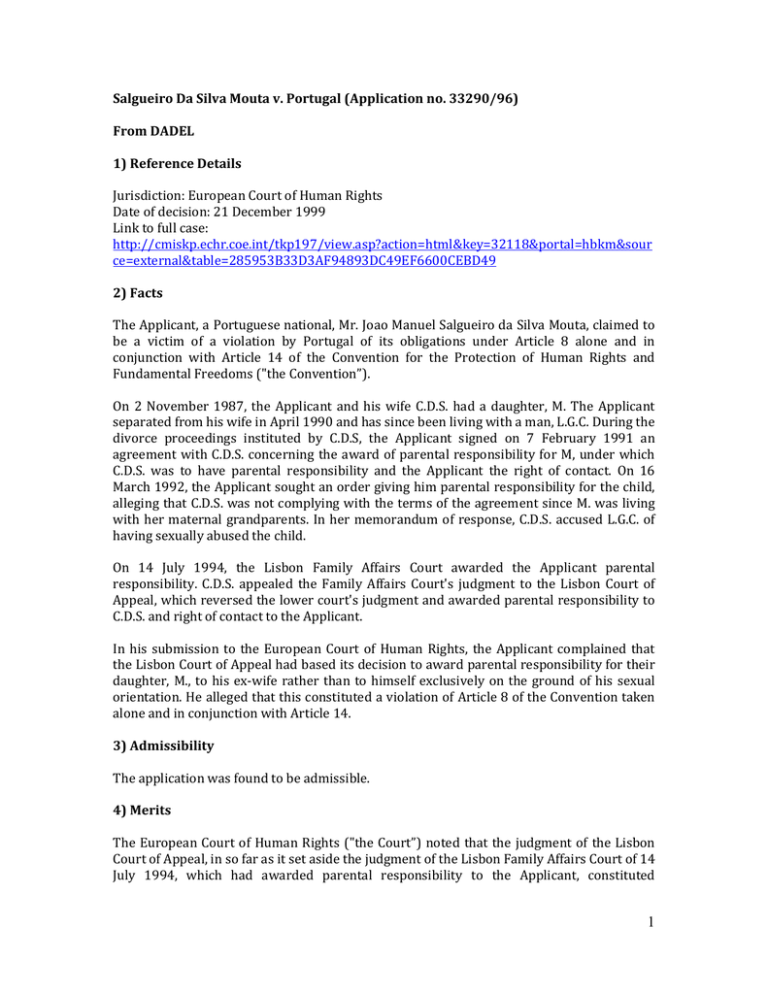
Salgueiro Da Silva Mouta v. Portugal (Application no. 33290/96)
From DADEL
1) Reference Details
Jurisdiction: European Court of Human Rights
Date of decision: 21 December 1999
Link to full case:
http://cmiskp.echr.coe.int/tkp197/view.asp?action=html&key=32118&portal=hbkm&sour
ce=external&table=285953B33D3AF94893DC49EF6600CEBD49
2) Facts
The Applicant, a Portuguese national, Mr. Joao Manuel Salgueiro da Silva Mouta, claimed to
be a victim of a violation by Portugal of its obligations under Article 8 alone and in
conjunction with Article 14 of the Convention for the Protection of Human Rights and
Fundamental Freedoms ("the Convention”).
On 2 November 1987, the Applicant and his wife C.D.S. had a daughter, M. The Applicant
separated from his wife in April 1990 and has since been living with a man, L.G.C. During the
divorce proceedings instituted by C.D.S, the Applicant signed on 7 February 1991 an
agreement with C.D.S. concerning the award of parental responsibility for M, under which
C.D.S. was to have parental responsibility and the Applicant the right of contact. On 16
March 1992, the Applicant sought an order giving him parental responsibility for the child,
alleging that C.D.S. was not complying with the terms of the agreement since M. was living
with her maternal grandparents. In her memorandum of response, C.D.S. accused L.G.C. of
having sexually abused the child.
On 14 July 1994, the Lisbon Family Affairs Court awarded the Applicant parental
responsibility. C.D.S. appealed the Family Affairs Court's judgment to the Lisbon Court of
Appeal, which reversed the lower court's judgment and awarded parental responsibility to
C.D.S. and right of contact to the Applicant.
In his submission to the European Court of Human Rights, the Applicant complained that
the Lisbon Court of Appeal had based its decision to award parental responsibility for their
daughter, M., to his ex-wife rather than to himself exclusively on the ground of his sexual
orientation. He alleged that this constituted a violation of Article 8 of the Convention taken
alone and in conjunction with Article 14.
3) Admissibility
The application was found to be admissible.
4) Merits
The European Court of Human Rights ("the Court”) noted that the judgment of the Lisbon
Court of Appeal, in so far as it set aside the judgment of the Lisbon Family Affairs Court of 14
July 1994, which had awarded parental responsibility to the Applicant, constituted
1
interference with the Applicant's right to respect for his family life and thus required the
application of Article 8.
The Court found that in reversing the decision of the Lisbon Family Affairs Court and,
consequently, awarding parental responsibility to the mother rather than the father, the
Court of Appeal introduced a new factor, namely that the Applicant was a homosexual and
was living with another man. The Court concluded that there was a difference of treatment
between the Applicant and M.'s mother, which was based on the Applicant's sexual
orientation, a concept which is covered by Article 14 of the Convention.
Based on its prior case-law, the Court reiterated that a difference of treatment is
discriminatory within the meaning of Article 14 if it has no objective and reasonable
justification that is if it does not pursue a legitimate aim or if there is no reasonable
relationship of proportionality between the means employed and the aim sought to be
realized.
The Court determined that the Court of Appeal's decision undeniably pursued a legitimate
aim, namely the protection of the health and rights of the child. However, it took notice of
the language used by the Court of Appeals: "The child should live in ... a traditional
Portuguese family" and "It is not our task here to determine whether homosexuality is or is
not an illness or whether it is a sexual orientation towards persons of the same sex. In both
cases it is an abnormality and children should not grow up in the shadow of abnormal
situations.” In the European Court's view, the above passages suggest that the Applicant's
homosexuality was a factor that was decisive in the final decision. The European Court
found that the Court of Appeal made a distinction based on considerations regarding the
Applicant's sexual orientation, a distinction that is not acceptable under the Convention. It
concluded that there was no reasonable relationship of proportionality between the means
employed and the aim pursued; and thus a violation of the Convention occurred. In view of
its decision on Article 8 taken in conjunction with Article 14, the Court considered it
unnecessary to rule on the allegation of a violation of Article 8 taken alone.
5) Decision
The Court unanimously found a violation by Portugal of Article 8 in conjunction with Article
14 of the Convention. The Court considered that the finding of a violation set out in the
present judgment constituted in itself sufficient just satisfaction.
2

